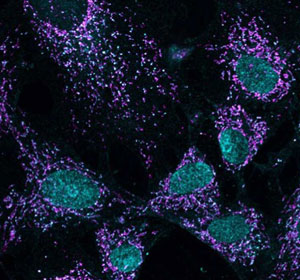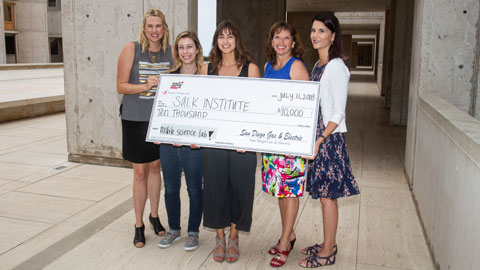|
|
 |
July 2018 |
|
|
|
|
|
|
|
|
Salk scientists discover how learned behaviors are organized and controlled by different brain cell types
|
|
|
|
Driving to work, typing an email or making coffee are examples of actions people perform routinely each day. But neuroscientists are still unsure how the brain orchestrates complex actions or switches to a new action
---behaviors that are impaired in disorders such as Parkinson's disease or obsessive
---compulsive disorder.
Scientists have long debated whether these types of steps are organized in a chain, with each step triggering the next (like falling dominoes) or whether there is a more hierarchical system at work, with multiple levels of control (like an office organization chart).
The team of Associate Professor
Xin Jin discovered that learned behavior is organized in a hierarchy with multiple levels of control, offering possible new therapeutic targets for disorders that involve an inability to control one's actions. The work appeared in the journal
Cell on June 28.
|
|
|
|
|
| Salk-led study clarifies dual role of protein that watches for cellular threats and repairs damage |
|
 |
Salk Professor
Gerald Shadel and collaborators found that a protein called ATM can sense the presence of toxins called reactive oxygen species and responds by sounding the alarm to trigger the production of antioxidants. The work, which appeared in
Science Signaling on July 10, could have implications for a disease in which ATM is dysfunctional
---and could also reveal ways to boost cellular health overall.
|
|
|
|
|
Salk scientists discover how satellite RNA leads to cancer
|
|
|
Only some of us have satellite TV in our homes, but all of us have satellite DNA in our bodies
---short, repetitive DNA sequences near the middle and ends of chromosomes. Working copies of satellite DNA, known as satellite RNA, is high in some cancers. Salk scientists discovered that a specific type of satellite RNA called hSATa induces breast cancer by directly interfering with DNA copying and damage repair. The research appeared in the journal
Molecular Cell on June 7.
|
|
|
|
|
|
|
Salk researcher Janelle Ayres receives prestigious award and grant
Associate Professor
Janelle Ayres recently received two significant awards in recognition of her work. First, she was named one of three winners of the Blavatnik National Awards for Young Scientists, one of the world's largest unrestricted prizes for early career researchers. Ayres, the laureate in the life sciences category, will receive $250,000 for her pioneering research in physiology and the study of how bacteria interact with humans. Second, she was awarded a $1 million grant from the W. M. Keck Foundation to study new ways to treat deadly infections, including sepsis and the flu, both of which require novel therapies beyond antibiotics and antivirals in the face of increasingly treatment-resistant strains.
|
|
|
Salk Institute scientist Eiman Azim wins coveted McKnight Scholar Award
Eiman Azim, an assistant professor in Salk's Molecular Neurobiology Laboratory, has received a McKnight Scholar Award from the McKnight Foundation. The award, which totals $225,000 over three years, encourages neuroscientists at early stages of their careers to focus on disorders of learning and memory. Highly coveted, this award is given to no more than six neuroscientists in any given year.
|
|
|
|
Five Salk researchers receive competitive grants from Padres Pedal the Cause
Salk scientists
Ronald Evans,
Diana Hargreaves,
Tony Hunter,
Graham McVicker and
Geoffrey Wahl are among the first wave of researchers to receive funding from Padres Pedal the Cause, one of one of the largest stand-alone cancer fundraising events in San Diego. The nonprofit raised $2.4 million for cancer research in November 2017 thanks to the efforts of more than 3,000 bicycle riders, sponsors, volunteers and donors.
|
|
|
Salk Education Outreach receives grant for Mobile Science Lab
 From left: Morgan Justice-Black (SDG&E), Madison Dodds, Amy Knight, Dona Mapston and Lisa Farnan
From left: Morgan Justice-Black (SDG&E), Madison Dodds, Amy Knight, Dona Mapston and Lisa Farnan
The
Education Outreach department was recently awarded an Environmental Champions grant from San Diego Gas & Electric for the Mobile Science Lab, which brings a hands-on genetics curriculum to middle school classrooms across San Diego County.
|
|
| Salk Professor Satchidananda Panda's new book on circadian rhythms and health garners media interest |
|
 |
This book, based on research from the
Panda lab on biological rhythms, diet and health, explains the importance of the circadian clock and how it works.
In the media:
|
|
|
|
|
Symphony at Salk - August 25, 2018
|
|
|
|
TICKETS ON SALE NOW
Please join us for a spectacular evening of music featuring the sensational San Diego Symphony and special guest artist, Tony Award-winning star of
Hamilton, Leslie Odom, Jr. Experience warm camaraderie, gourmet food and drink, a breathtaking sunset and refreshing ocean breezes against the backdrop of one of the world's most striking architectural masterpieces.
|
|
|
| Salk science wallpaper images |
|
Looking for a unique background image for your computer, iPad or phone?
This month's image is an aerial view of Salk.
|
| |
|
|
|
|
|
|
|
|
|
|
|
|